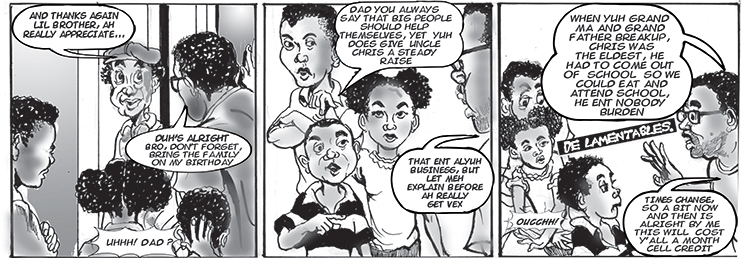THE inherited primordial burden of the male-child predisposes him to become monster, hero or victim, or ‘jus deh’. Expectations are imposed on him from early childhood: his toys differ; he’s the little man of the house;, his aunts declare that he’s going to be a hit with the girls; and if by a certain age there’s no girlfriend, there are family meetings to discuss seriously what is wrong with him.
“Ah hope he ent like duh” or, “I think he just sly like he uncle” or “Well if he deh suh, it ent from we side”. Growing up, the male constitutes far more challenges and complications than are anticipated. Nature does not discriminate by gender in its values and vices. There’s a social tendency to create from the individual experience the loud but irrational cause and crusade; a workable facade that can take on a life of its own to the detriment of the truth.

Precedents from live history, especially recent history erases doubt, and if seriously considered outside of our emotions, can positively influence how we think. In December 2014, a court incident captured my interest; it occurred before Magistrate Ann Mc Lennan. A young man was brought before the court for assaulting his mother over $500.
The charge read out was of abusive language against his mother, over her being unable to provide him with $500. No reference was made to his actions as a result of narcotics, from persons I had then asked who were around the courts. But there was a bigger problem, a problematic custom very prevalent and completely ignored by social services and communities; that custom of making sons surrogate fathers to the cancelling of their own development.
At the time of that incident, the young man was 17 years old. By his admission, he was on his own at 10 years old. To quote him, “From the age of 10 I was on my own and nobody don’t take care of me, but ah does buy things and give everybody and keep the lil wuh lef back fuh me.” This declaration was not contradicted by his mother or any of the “everybody” that the young man was referring to.
He further defined the “everybody” as family members. He worked in the bush and his mother admitted that he did give her money for the house. Another charge was read that alleged that the young man had threatened his aunt who had intervened in the matter on behalf of his mother. The magistrate resolved the matter by placing the young man on a bond before transferring the case.
The magistrate then urged him to give his mother extra money for the holidays. Were I sitting in that magistrate’s seat I would have requested a welfare officer to explore whether this 17-year-old was literate. Anything could be possible if he was on his own from 10 years old. Was it possible or even likely that he would be vulnerable to some legal skulduggery in the future because he took his freehandedness as deserving of loyalty and gratitude?
In the world we live in today, what are his options even in the goldfields? Everywhere there is the demand for paperwork, with contracts, working agreements of claims and for financing. A well-meaning signature attached to an unfair constructed document in the presence of a dishonest legal character can result in a life turned upside down. How many family members was this 17-year-old supporting at the time?
Was the home they were living in their property and was the aunt also a responsibility of his? I can remember my father instructing me in a related vein, “If is me or yuh mother yuh do business with, got paperwork that file under the court, cause you might be the child that got the bread, but yuh might not be the favourite one.” This young man’s aggressiveness may be a retaliation from senses warning him that something in his life had gone wrong, and that he was where he shouldn’t be.
He was performing in a capacity as a husband, a breadwinner and family patron, while barely a man. The entire situation was reversed. The mother, who should be his guardian, had placed him in the position of the absent male in her life, so where was the balancing advice to come from?
This is not an exact stereotype (as none are) but from the evidence revealed there are no grounds to dispute that it is an accepted social anomaly, not featured in the context of popular discourse on male responsibilities. There is also the total opposite of this. I know three brothers who lived with their mother on Thomas Street, Cummingsburg.
None of them worked. They borrowed clothes, hung out by the cinemas, courted young and older ladies who could sponsor their existence. The mother died, the landlord kicked them out of his property and everything went downhill. But the attention has to be given to the above case study and the context of his situation, where interception is necessary.



.jpg)







